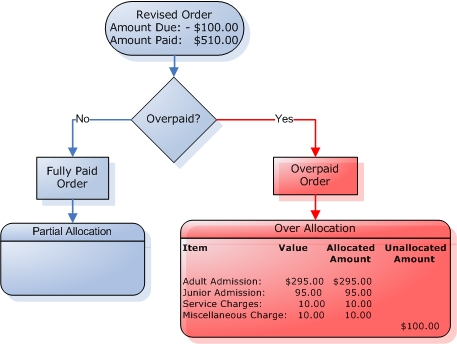Over allocation occurs when the payment or credit exceeds the total amount owing on the corresponding order. This can occur when a customer performs the following, after making a full payment:
•Removes items from an order
•Replaces an item with a lower-priced item
When an order is overpaid, the following occurs:
1.The outstanding amount is applied to all of the order items.
2.The overpayment amount is applied as an unallocated amount.
Suppose that after making a full payment to an existing $510.00 order, a customer decides to change a Senior Admission to a Junior Admission. This results in an overpaid balance of $100.00.
The order and its corresponding transaction history are modified as follows:
Order Item |
Net Value |
Service Charges |
Grand Total |
Adult Admission |
$295.00 |
$5.00 |
$300.00 |
Senior Admission Junior Admission |
$195.00 $95.00 |
$5.00 $5.00 |
$200.00 $100.00 |
Miscellaneous Charge |
|
$10.00 |
$10.00 |
|
$490.00 $390.00 |
$20.00 |
$510.00 $410.00 |
Transaction ID |
Transaction Type |
Debit |
Credit |
1 |
Order Creation |
$510.00 |
|
2 |
Customer Payment |
|
$510.00 |
3 |
Change Admission |
- $100.00 |
|
Upon applying the changes to this order, the current payment is re-allocated as follows:
